
Ray Erskine Parker Jr. is an American musician, singer, songwriter, and record producer. As a solo performer, he wrote and performed the theme song for the 1984 film Ghostbusters and also sounds from the animated series The Real Ghostbusters. Previously, Parker achieved a US top-5 hit in 1982 with "The Other Woman". Born and raised in Detroit, Parker also performed with his band, Raydio, and with Barry White in the Love Unlimited Orchestra.

"I Can't Get Next to You" is a 1969 No. 1 single recorded by the Temptations and written by Norman Whitfield and Barrett Strong for the Gordy (Motown) label. The song was a No. 1 single on the Billboard Top Pop Singles chart for two weeks in 1969, from October 18 to October 25, replacing "Sugar, Sugar" by the Archies and replaced by "Suspicious Minds" by Elvis Presley. The single was also a No. 1 hit on the Billboard Top R&B Singles for five weeks, from October 4 to November 1, replacing "Oh, What a Night" by the Dells, and replaced by another Motown song, "Baby I'm For Real" by the Originals.
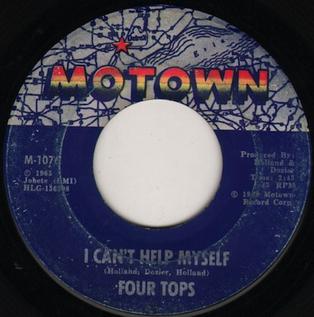
"I Can't Help Myself" is a 1965 song recorded by the Four Tops for the Motown label.

"Baby I Need Your Loving" is a 1964 hit single recorded by the Four Tops for the Motown label. Written and produced by Motown's main production team Holland–Dozier–Holland, the song was the group's first Motown single and their first pop Top 20 hit, making it to number 11 on the US Billboard Hot 100 and number four in Canada in the fall of 1964. It was also their first million-selling hit single.

"I Can't Stop Loving You" is a popular song written and composed by the country musician Don Gibson, who first recorded it on December 3, 1957, for RCA Victor Records. It was released in 1958 as the B-side of "Oh, Lonesome Me", becoming a double-sided country hit single. At the time of Gibson's death in 2003, the song had been recorded by more than 700 artists, most notably by Ray Charles, whose recording reached No. 1 on the Billboard chart.
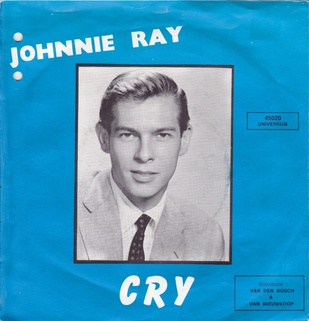
"Cry" is a 1951 popular song written by Churchill Kohlman. The song was first recorded by Ruth Casey on the Cadillac label. The biggest hit version was recorded in New York City by Johnnie Ray and The Four Lads on October 16, 1951. Singer Ronnie Dove also had a big hit with the song in 1966.

"I've Been Loving You Too Long" (originally "I've Been Loving You Too Long (To Stop Now)") is a soul music ballad written by Otis Redding and Jerry Butler. Considered by music critics and writers to be one of Redding's finest performances and a soul classic, it is a slow, emotional piece with Redding's pleading vocals backed by producer Steve Cropper's arpeggiated guitar parts and a horn section.
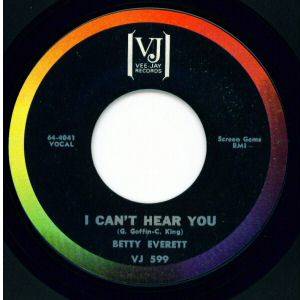
"I Can't Hear You No More" is a composition written by Gerry Goffin and Carole King. It was originally recorded as "I Can't Hear You" in 1964 by Betty Everett. The most successful version was the 1976 top 40 single by Helen Reddy.

"All I Ever Need Is You" is a popular song written by Jimmy Holiday and Eddie Reeves, and initially recorded by Ray Charles for his 1971 album, Volcanic Action of My Soul. The most well-known version of the song is the hit single by Sonny & Cher which, in 1971, reached No. 7 on the U.S. Billboard Hot 100, and was their single of greatest chart longevity, spending 15 weeks on that chart. Their album by the same title sold over 500,000 copies reaching RIAA gold status.

"Maniac" is a song from the 1983 film Flashdance that was written by Dennis Matkosky and its performer, Michael Sembello. The original idea for the song came to Matkosky while watching a news report on a serial killer, which inspired gruesome lyrics that he and Sembello expanded upon after finding a 1980 horror film with the same name. When Flashdance director Adrian Lyne grew attached to the demo of the song used during filming, his music supervisor Phil Ramone requested lyrics more appropriate for their story of a dancer and worked with Sembello to produce a new version for the soundtrack. The new recording was used for a scene in which protagonist Alexandra Owens trains rigorously at home.

"You're the Best Thing That Ever Happened To Me" — also known simply as "Best Thing That Ever Happened To Me" — is a song written by Jim Weatherly. It was first recorded in 1973 by Danny Thomas. Soon after it was done by Ray Price from his album You're the Best Thing That Ever Happened To Me. The song enjoyed two runs of popularity, each by an artist in a different genre.

"Crying Time" is a song from 1964 written and originally recorded by the American country music artist Buck Owens. It gained greater success in the version recorded by Ray Charles, which won two Grammy Awards in 1967. Numerous other cover versions have been performed and recorded over the intervening years.

"With You I'm Born Again" is a 1979 duet written by Carol Connors and David Shire that originated on the soundtrack of the 1979 motion picture Fast Break. It was performed by Motown recording artists Billy Preston and Syreeta Wright and became an international hit for the duo, reaching number four on the Billboard Hot 100 and number two on the UK singles chart.

"A Woman Needs Love (Just Like You Do)" is a 1981 song recorded by American R&B vocalist and songwriter Ray Parker Jr., along with his group, Raydio. It led their 1981 album, A Woman Needs Love, the last Parker recorded with Raydio.

Andy Williams' Dear Heart is the sixteenth studio album by American pop singer Andy Williams and was released in the spring of 1965 by Columbia Records and was the last of his Columbia releases that remained exclusively within the realm of traditional pop. After covering two Beatles hits on his next non-holiday studio album, The Shadow of Your Smile, he would try out samba music on In the Arms of Love, aim for a much younger crowd with "Music to Watch Girls By" on Born Free, and focus more on contemporary material on subsequent albums.

Johnny's Greatest Hits is a compilation album by vocalist Johnny Mathis that was released by Columbia Records on March 17, 1958; the album has been described as the "original greatest-hits package". The LP collected all but one of the songs from the first six singles he recorded, including eight A- and B-sides that made the singles charts in The Billboard as well as three B-sides that did not chart and one new track that was co-written by Mathis but not released as a single.

Love Story is an album by American pop singer Johnny Mathis that was released on February 10, 1971, by Columbia Records and included a recent Oscar nominee, a flashback to 1967 ("Traces"), a new song by Bacharach & David, a lesser-known one by Goffin & King, and two songs that originated in film scores from 1970 and had lyrics added later: the album closer, "Loss of Love", from Sunflower and the album opener from Love Story, which was subtitled "Where Do I Begin". The norm for Mathis projects from this era was to cover recent hits, and the title track of this one was so recent that the version by Andy Williams began a 13-week run to number nine on Billboard magazine's Hot 100 chart in February 1971, coinciding with the release of this LP.

The Best of Johnny Mathis 1975–1980 is a compilation album by American pop singer Johnny Mathis that was released in the fall of 1980 by Columbia Records. This collection is similar to his last major compilation, 1972's Johnny Mathis' All-Time Greatest Hits, in that it excludes many of his American radio hits of this period in favor of songs that made the UK singles chart or contemporary hits by other people.
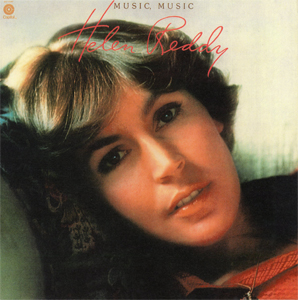
Music, Music is the eighth studio album by Australian-American pop singer Helen Reddy that was released in the summer of 1976 by Capitol Records and later described by J. Scott McClintock for AllMusic: "There are breezy, Bacharach-ian excursions, bluesy numbers, light country ('Mama'), jazzy ballads, and even a little Philly soul. On August 2 of that year the Recording Industry Association of America awarded the album with Gold certification for sales of 500,000 copies in the United States.
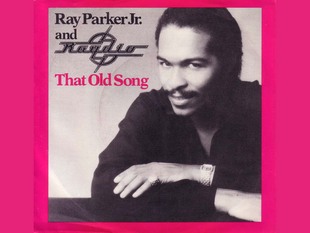
"That Old Song" is a 1981 song recorded by American R&B vocalist and songwriter Ray Parker Jr., along with his group, Raydio. It was the third of four single releases from their 1981 album, A Woman Needs Love, the last Parker recorded with Raydio. It was the second biggest hit from the album, after "A Woman Needs Love ."




















